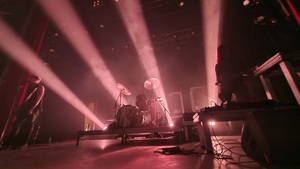
Burn Halo
Elianne Halbersberg
For every band that “makes it” in the music industry, there are hundreds, if not thousands, that don’t.
Upon the dissolution of his longtime band Eighteen Visions, singer/songwriter James Hart was determined not to become one of those statistics. Almost immediately, he began commuting from his home in Orange County, CA, to Tulsa, OK, to collaborate with songwriter Zac Maloy and track with top session musicians on the material that was to become Burn Halo’s self-titled debut album.
Signed to Island/Def Jam, Hart’s future was promising… until the label let go his A&R representative, which in turn led to a loss of interest in his project. Hart was then left to face his own future and an internal battle as to what he should do next. Music being his passion, after much thought and soul-searching he assembled the musicians who became Burn Halo: lead guitarist Joey Roxx, drummer Timmy Russell, bassist Aaron Boheler, and rhythm guitarist Allen Wheeler. Hart says that his vision was to create “a very straightforward rock album,” which is in fact what he did. The CD lends itself to the classic rock sounds not only of the last decade or two, but also pays homage to generations before – heavy on the guitar riffs, aggressive in its approach, yet at the same time featuring memorable ballads. Hart’s love of melody also makes it possible for the band to perform the tracks acoustically without sacrificing any of the dynamics. Radio quickly responded to Burn Halo’s first single, the hard-hitting “Dirty Little Girl,” and the band immediately took to the road.
While the story may appear typical at first glance, everything that has happened to Burn Halo is the result of careful career blueprinting and Hart’s astute business sense. Burn Halo travels with no tour support. Band members take turns driving the van, they share one hotel room, and after gigs you’ll find them outside the venue with boxes of autographed CDs for sale. It’s as D.I.Y. as it gets. Many bands do it, but clearly James Hart knows something that others don’t. In a recent interview with Ink 19, he shared the often Zen-like quality of his insight.
You were in Eighteen Visions for ten years, and then the band was no more. Did you think, “This is it, now what do I do?”
Honestly, I didn’t skip a beat. I had sensed that the band was kind of winding down. Even though we had great touring through 2006, I sensed that everyone’s heads were not in the right place and at some point it would happen. In early 2007 some of the guys didn’t seem into it anymore. My manager, Bret Bair, has been in the business a long time and he also sensed that the band was over. He wanted to figure something out for me to keep going, so he put together the writing sessions for me with Zac Maloy even before Eighteen Visions played our last two shows. So I was working right away and that was a good thing. There was no down time and I didn’t have to get over the whole thing because I knew I was still focused on making music. Coming to terms with Eighteen Visions not being a band anymore, after the attitude and demeanor on tour, made it much easier when we called it quits.
You got a deal with Island/Def Jam, you lost the deal in 2008, and then you thought…
Then it sank in: What do I do next? Everything seemed too good to be true, going from a band with good international and national touring success to a really good deal with a major label. Then my A&R guy was gone and I followed. It was frustrating because I met so many A&R guys and for some reason they all could not pass the ball through the hoop, whether it was the president of A&R not into what I was doing or that they didn’t care.
Suddenly I have a band up and running, selling records, we’re on the radio and interest is up again. It wasn’t easy. I sat long and hard, I prayed about it, I wondered if maybe music was not for me or there was something else I was put on Earth to do. Then my manager was given his own label [Rawkhead Rekords, through Warner Music Group’s Independent Label Group] to put this record out and it made so much sense: we have more direction and control to get it up off the ground. It’s a good situation. I’m blessed to be in it.
You mentioned prayer. Your faith is obviously important to you. Does that surprise people? There’s always a tendency to make visual judgments, and when people first see the band or watch the video for “Dirty Little Girl,” you know what they probably think.
I don’t think anybody questions or second-guesses me or who I am or what I do. I found faith on my own. I was brought up in it a little bit, but not to the extent of people I know. I had battles with life in general, my purpose on Earth and dealing with situations I came across. “Why is this happening? I’m in a bad situation. If there’s a God, why would He let it happen to me?” I had it all backward. It took growing up, maturing, and finding myself and my purpose. People do make judgments off of visualizations, and the video for “Dirty Little Girl” is a bit sexual, for sure, but the song is not about womanizing or portraying women as toys, like a typical rock and roll song. It’s a real-life story portrayed through the video. If people get that, great, and if not, that’s fine as well. The song is about a real person who took advantage of a friend of mine, and she got away with everything she did to him. He always went back to her. That’s what the song is about. Most people who listen to it know that we’re not about putting women out there as objects. I want to make that clear. As far as how my faith plays a role, I only speak for myself, not the band, but I feel I’m a pretty righteous person with solid intentions.
Let’s talk about Burn Halo’s D.I.Y. story. You started your own label. So many artists do the same thing, but they don’t reach this level. What did you know that they didn’t that enabled you to get the distribution, the tours, the air play?
What we had, first and foremost, was a proper game plan from the second the band started up to now. We knew exactly what record to make, who to market it to, which bands to tour with, and the format at radio to start with.
Radio promotion and touring are the hard parts. I made a lot of connections and friends with Eighteen Visions and when it was time to develop this group on the road, they were there to help me out. You need a story and something working in your favor, you need tours, a promotion staff, which we have through the Independent Label Group, which helps the radio climb. It’s a slow building process, building a story, and that’s important.
I also knew that I needed to be smart financially and run this as a business. During so many years with my other band I saw where we spent and blew money and how we didn’t market as we should have. That had a lot to do with the decline of the band. From day one, Burn Halo got in the van with no crew so that we could put money in our pockets to do this. There was a light at the end of the tunnel for people who wanted to join me, be my band, and tour with me. I learned so much over ten or twelve years in the industry about how to be in a band, run a band, and be successful. You need people on the same page who share your vision. We have two years mapped out and we can show a plan, the tours we’re getting and can get on – we have a clear-cut identity and path and vision to get from Point A to Point B.
How is doing it yourself an extra challenge and an advantage?
From a touring standpoint, there’s a lot more weight on my shoulders. I tour-manage the band on a daily basis. We have no crew. There’s a lot more hands-on work for the band and that will continue until we feel comfortable enough to get on a bus and get a couple of crew members. The disadvantage is that we don’t get as much sleep, but everyone makes more money where we are now. That’s the most important thing, because if there’s no light at the end of that tunnel, I can’t afford to do this right now, and the other guys as well. There has to be something there that keeps the spirit alive. Nobody is worrying about making rent, and that’s definitely been an issue in the past. The experience it gives us is irreplaceable.
This is also a self-financed tour: one motel room, one van, selling CDs in the parking lot after the show. It sounds like such a struggle, yet there are signed bands on major labels doing the same thing.
I don’t want to take tour support, because Eighteen Visions took it and you feel that because the bus is covered we can hire this guy and that guy, and the next thing you know you’re in over your head. And if you take too much money and you’re not selling records, you’re no longer a priority, and then you’re at the bottom of the totem pole. The luxuries are taken away and that makes it hard to go back to the van and load your stage and trailer yourself. I feel like taking tour support is silly for us. We’ve proved that we can do it ourselves, so why spend our money on that stuff? There’s no point.
Was it hard to find musicians who believe in your vision?
Yes and no. I met a couple of people along the way who felt I should do things differently and run the band differently. The guys I have now, I think, all share the same ideas, trust me, believe in me and in the songs, and are as much a part of it as I am. We’re selling a record, and they know that they help do that every night.
You’ve been doing this long enough to have watched the business change dramatically. How has it changed for better and for worse?
I don’t know if I can say that it has changed for the better. The Internet has caused problems, and at the same time it is beneficial. I can easily self-promote my songs and my band instead of doing it the old-school way of going on the road first and doing press, because people don’t really buy magazines anymore since everything is online. It has killed record sales and created much more competition. People are picky because there’s so much out there. Downloading has affected and impacted it. But that’s the changing of the times and survival of the fittest, so, to survive and succeed you need (1) to be smart about your business, (2) songs that translate live, on record and on the radio, and (3) onstage you’ve got to put it all out there and put on a great show, because in today’s economy when people spend money on a concert ticket you’d better give them their money’s worth. We try to do that on a nightly basis, and that’s why we’re successful and why we’re running this thing ourselves.
This genre of hard rock music has experienced a resurgence. How big a part did that, the timing, play in the success of this band?
Timing is everything. I wanted to get this thing on the road within months of Eighteen Visions disbanding. I wanted to make a record and be on the road within six to eight months. It didn’t work out that way. Why? My belief is that everything happens for a reason and that part of the plan was already laid out for me. It was a matter of whether I chose to make the right decision. I think if I had tried to get on the road immediately after Eighteen Visions, that band would have carried over and people would not have understood. The record would have come out on Island and not happened the way it needed to. Thankfully, I’m very, very patient, and that patience paid off. The opportunities presented worked out perfectly for us.
Burn Halo: http://www.myspace.com/burnhalo ◼












